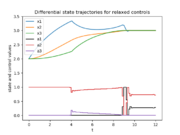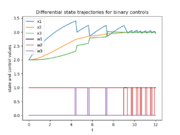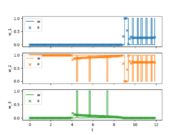Difference between revisions of "Three Tank multimode problem"
ClemensZeile (Talk | contribs) (→Reference Solutions) |
ClemensZeile (Talk | contribs) |
||
| (One intermediate revision by the same user not shown) | |||
| Line 38: | Line 38: | ||
<gallery caption="Reference solution plots" widths="180px" heights="140px" perrow="2"> | <gallery caption="Reference solution plots" widths="180px" heights="140px" perrow="2"> | ||
| − | Image:three_tank_relaxed_solution.png| Optimal relaxed controls and states determined by an direct approach with python 3.6 and CasADi, applied Multiple Shooting, 4th order Runge Kutta scheme and | + | Image:three_tank_relaxed_solution.png| Optimal relaxed controls and states determined by an direct approach with python 3.6 and CasADi, applied Multiple Shooting, 4th order Runge Kutta scheme and 100 discretization intervals. |
Image:three_tank_binary_solution.png| According optimal binary controls and states determined by the direct approach. The relaxed controls were approximated by Combinatorial Integral Approximation. | Image:three_tank_binary_solution.png| According optimal binary controls and states determined by the direct approach. The relaxed controls were approximated by Combinatorial Integral Approximation. | ||
Image:three_tank_rounding_solution.png| Binary and relaxed control values as part of the Combinatorial Integral Approximation problem | Image:three_tank_rounding_solution.png| Binary and relaxed control values as part of the Combinatorial Integral Approximation problem | ||
</gallery> | </gallery> | ||
| + | == Source Code == | ||
| + | |||
| + | Model description is available in (using pycombina for solving the (CIA) rounding problem step): | ||
| + | * [[:Category:Casadi | Casadi code]] at [[Three Tank multimode problem (python/casadi)]] | ||
Latest revision as of 11:18, 14 March 2020
| Three Tank multimode problem | |
|---|---|
| State dimension: | 1 |
| Differential states: | 3 |
| Discrete control functions: | 3 |
| Interior point equalities: | 2 |
This site describes a Double tank problem variant with three binary controls instead of only one control and three tanks, i.e., three differential states representing different compartments.
Mathematical formulation
The mixed-integer optimal control problem is given by
![\begin{array}{llll}
\displaystyle \min_{x,w} & \displaystyle \int_{0}^{T} & k_1(x_2-k_2)^2 + k_3(x_3-k_4)^2 \; \text{d}t\\[1.5ex]
\mbox{s.t.} & \dot{x}_1 & = -\sqrt{x_1}+c_1 w_1 + c_2 w_2 - w_3 \sqrt{c_3 x_3}, \\[1.5ex]
& \dot{x}_2 & = \sqrt{x_1}-\sqrt{x_2}, \\[1.5ex]
& \dot{x}_3 & = \sqrt{x_2}-\sqrt{x_3}+w_3 \sqrt{c_3 x_3}, \\[1.5ex]
& x(0) & = (2,2,2)^T, \\[1.5ex]
& 1 & = \sum\limits_{i=1}^{3}w_i(t), \\
& w_i(t) &\in \{0, 1\}, \quad i=1\ldots 3.
\end{array}](https://mintoc.de/images/math/4/2/d/42d3b84d911ff55d739f45e69e30c66a.png)
Parameters
These fixed values are used within the model.

Reference Solutions
If the problem is relaxed, i.e., we demand that  be in the continuous interval
be in the continuous interval ![[0, 1]](https://mintoc.de/images/math/c/c/f/ccfcd347d0bf65dc77afe01a3306a96b.png) instead of the binary choice
instead of the binary choice  , the optimal solution can be determined by means of direct optimal control and the CIA decomposition. We denote the relaxed control values with
, the optimal solution can be determined by means of direct optimal control and the CIA decomposition. We denote the relaxed control values with ![a(t)\in[0, 1]](https://mintoc.de/images/math/4/0/b/40bb993077fb6b4b53efa4d38c7b14b1.png) .
.
The optimal objective value of the relaxed problem with  is
is  . The objective value of the binary controls obtained by Combinatorial Integral Approimation (CIA) is
. The objective value of the binary controls obtained by Combinatorial Integral Approimation (CIA) is  .
.
- Reference solution plots
Source Code
Model description is available in (using pycombina for solving the (CIA) rounding problem step):


